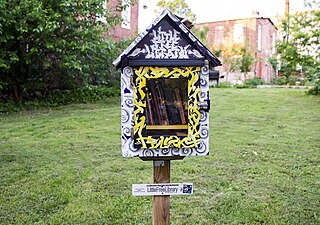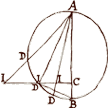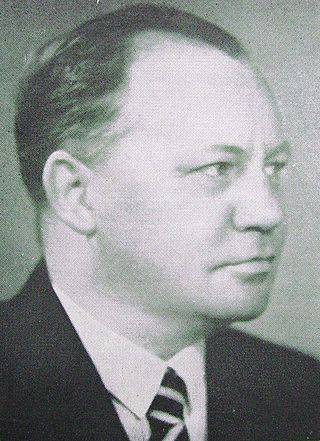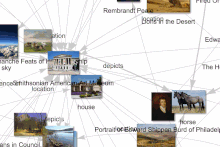
Interdisciplinarity or interdisciplinary studies involves the combination of multiple academic disciplines into one activity. It draws knowledge from several fields like sociology, anthropology, psychology, economics, etc. It is related to an interdiscipline or an interdisciplinary field, which is an organizational unit that crosses traditional boundaries between academic disciplines or schools of thought, as new needs and professions emerge. Large engineering teams are usually interdisciplinary, as a power station or mobile phone or other project requires the melding of several specialties. However, the term "interdisciplinary" is sometimes confined to academic settings.
Social epistemology refers to a broad set of approaches that can be taken in epistemology that construes human knowledge as a collective achievement. Another way of characterizing social epistemology is as the evaluation of the social dimensions of knowledge or information.

Discourse is a generalization of the notion of a conversation to any form of communication. Discourse is a major topic in social theory, with work spanning fields such as sociology, anthropology, continental philosophy, and discourse analysis. Following pioneering work by Michel Foucault, these fields view discourse as a system of thought, knowledge, or communication that constructs our experience of the world. Since control of discourse amounts to control of how the world is perceived, social theory often studies discourse as a window into power. Within theoretical linguistics, discourse is understood more narrowly as linguistic information exchange and was one of the major motivations for the framework of dynamic semantics, in which expressions' denotations are equated with their ability to update a discourse context.

Paul-Michel Foucault was a French philosopher, historian of ideas, writer, political activist, and literary critic. Foucault's theories primarily address the relationships between power and knowledge, and how they are used as a form of social control through societal institutions. Though often cited as a structuralist and postmodernist, Foucault rejected these labels. His thought has influenced academics, especially those working in communication studies, anthropology, psychology, sociology, criminology, cultural studies, literary theory, feminism, Marxism and critical theory.

The sociology of knowledge is the study of the relationship between human thought, the social context within which it arises, and the effects that prevailing ideas have on societies. It is not a specialized area of sociology. Instead, it deals with broad fundamental questions about the extent and limits of social influences on individuals' lives and the social-cultural basis of our knowledge about the world. The sociology of knowledge has a subclass and a complement. Its subclass is sociology of scientific knowledge. Its complement is the sociology of ignorance.
The concept of a carceral archipelago was first used by the French historian and philosopher Michel Foucault in his 1975 publication, Surveiller et Punir, to describe the modern penal system of the 1970s, embodied by the well-known penal institution at Mettray in France. The phrase combines the adjective "carceral", which means that which is related to jail or prison, with archipelago—a group of islands. Foucault referred to the "island" units of the "archipelago" as a metaphor for the mechanisms, technologies, knowledge systems and networks related to a carceral continuum. The 1973 English publication of the book by Solzhenitsyn called The Gulag Archipelago referred to the forced labor camps and prisons that composed the sprawling carceral network of the Soviet Gulag.

The Max Planck Institute for the History of Science is a scientific research institute founded in March 1994. It is dedicated to addressing fundamental questions of the history of knowledge from the Neolithic era to the present day, and its researchers pursue a historical epistemology in their study of how new categories of thought, proof, and experience have emerged in interactions between the sciences and their ambient cultures.

Peter Louis Galison is an American historian and philosopher of science. He is the Joseph Pellegrino University Professor in history of science and physics at Harvard University.
Objectivity in science is an attempt to uncover truths about the natural world by eliminating personal biases, emotions, and false beliefs. It is often linked to observation as part of the scientific method. It is thus intimately related to the aim of testability and reproducibility. To be considered objective, the results of measurement must be communicated from person to person, and then demonstrated for third parties, as an advance in a collective understanding of the world. Such demonstrable knowledge has ordinarily conferred demonstrable powers of prediction or technology.

Lorraine Daston is an American historian of science. Director emerita of the Max Planck Institute for the History of Science (MPIWG) in Berlin, and visiting professor in the Committee on Social Thought at the University of Chicago, she is an authority on Early Modern European scientific and intellectual history. In 1993, she was named a fellow of the American Academy of Arts and Sciences. She is a permanent fellow at the Berlin Institute for Advanced Study.
An academic discipline or academic field is a subdivision of knowledge that is taught and researched at the college or university level. Disciplines are defined and recognized by the academic journals in which research is published, and the learned societies and academic departments or faculties within colleges and universities to which their practitioners belong. Academic disciplines are conventionally divided into the humanities, including language, art and cultural studies, and the scientific disciplines, such as physics, chemistry, and biology; the social sciences are sometimes considered a third category.
Ecogovernmentality, is the application of Foucault's concepts of biopower and governmentality to the analysis of the regulation of social interactions with the natural world. The concept of Ecogovernmentality expands on Foucault's genealogical examination of the state to include ecological rationalities and technologies of government. Begun in the mid-1990s by a small body of theorists the literature on ecogovernmentality grew as a response to the perceived lack of Foucauldian analysis of environmentalism and in environmental studies.
Dispositif or dispositive is a term used by the French intellectual Michel Foucault, generally to refer to the various institutional, physical, and administrative mechanisms and knowledge structures which enhance and maintain the exercise of power within the social body. The links between these elements are said to be heterogeneous since knowledge, practices, techniques, and institutions are established and reestablished in every age. It is through these links that power relations are structured.
History of Intellectual Culture (HIC) is an international yearbook devoted to the history of knowledge. It was founded in 2021 and is published by De Gruyter. Its editors-in-chief are Charlotte A. Lerg (Munich), Johan Östling (Lund), and Jana Weiß (Münster). The yearbook is the successor of the journal of the same name, founded in 1999.
Frank W. Stahnisch is a historian of medicine and neuroscience at the University of Calgary in Canada, where he holds the endowed Alberta Medical Foundation/Hannah Professorship in the History of Medicine and Health Care. He is jointly appointed in the Department of History, Faculty of Arts, and the Department of Community Health Sciences, Cumming School of Medicine, and is a member of the Calgary Hotchkiss Brain Institute and the O'Brien Institute for Public Health. He has also received an adjunct professorship in the Department of Classics and Religion of the Faculty of Arts. His research interests in the history and philosophy of the biomedical sciences cover: the development of modern physiology and experimental medicine, the history of neuroscience and the history of psychiatry, as well as the development of modern medical visualization practices. Since 2015, he has succeeded Professor Malcolm Macmillan as an Editor-in-Chief of the international "Journal of the History of the Neurosciences", and since 2021 he is also an Associate Editor for the History and Philosophy of the Behavioural Neurosciences with "Frontiers in Psychology"
Søren Gosvig Olesen is an associate professor in philosophy at the University of Copenhagen and has written extensively in the tradition of continental philosophy as well as translating a number of philosophers central to this tradition: Martin Heidegger, Jacques Derrida, Michel Foucault and Giorgio Agamben. Olesen is a graduate from Université de Paris I-Sorbonne, and defended his doctorate degree with Wissen und Phänomen (1997) from Université de Nice. Olesen has notably advanced the notion of transcendental history.

The Institute for Advanced Study in Berlin is an interdisciplinary institute founded in 1981 in Grunewald, Berlin, Germany, dedicated to research projects in the natural and social sciences. It is modeled after the original IAS in Princeton, New Jersey and is a member of Some Institutes for Advanced Study.
Lyckoslanten is a free quarterly children's magazine based in Stockholm, Sweden. It has been in circulation since 1926.
Hans-Jörg Rheinberger is an historian of science who comes from Liechtenstein. He was director of the Max Planck Institute for the History of Science in Berlin from 1997 to 2014. His focus areas within the history of science are the history and epistemology of the experiment, and further the history of molecular biology and protein biosynthesis. Additionally he writes and publicizes essays and poems.

Axel Gjöres (1889–1979) was a Swedish social democrat politician who served in different government posts. He was the minister of supply between 1941 and 1947 and minister of commerce and industry between 1947 and 1948.









